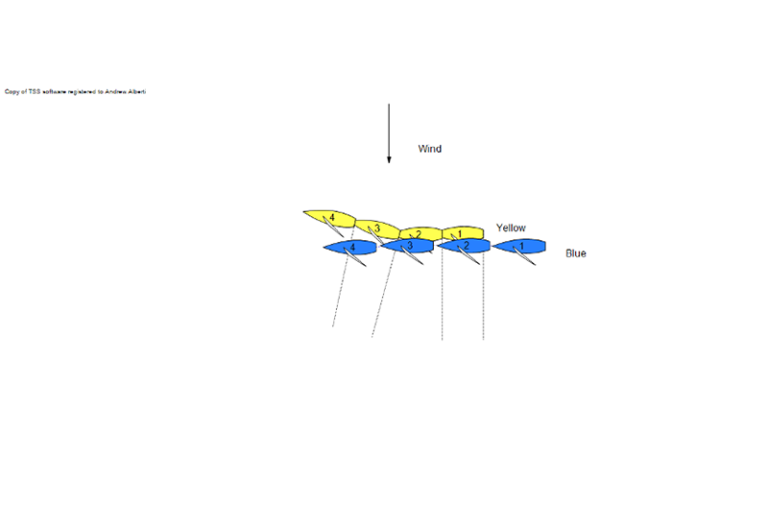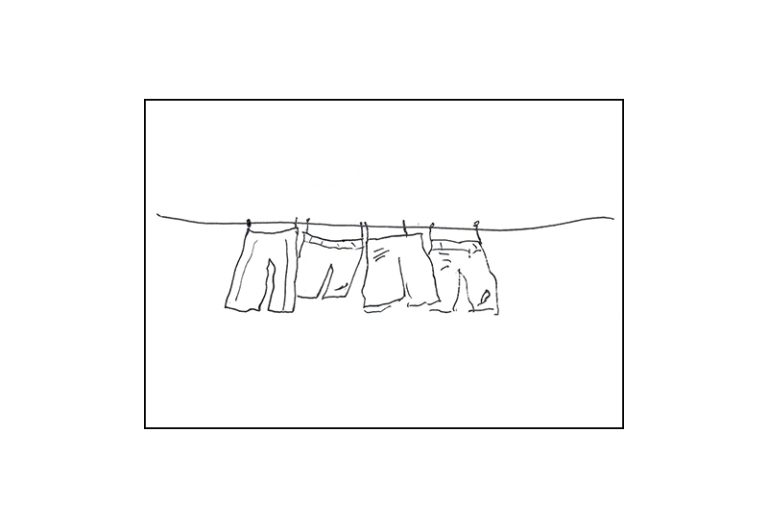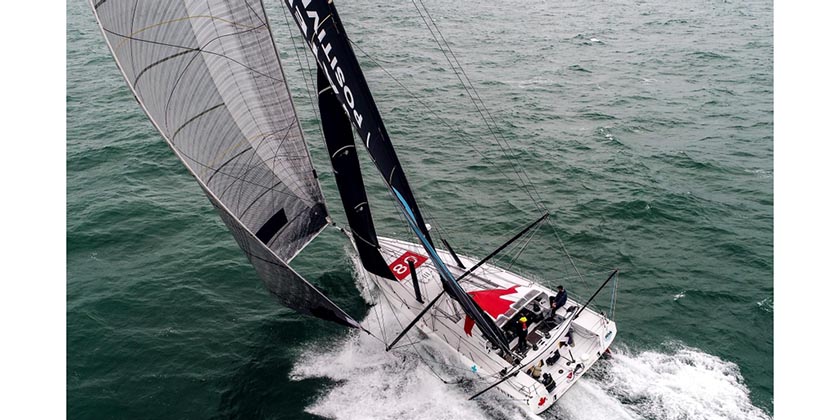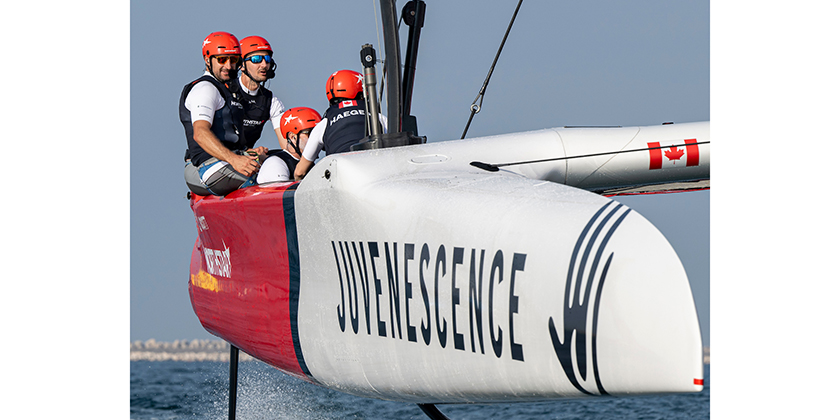The Rules Guy: Required Hails
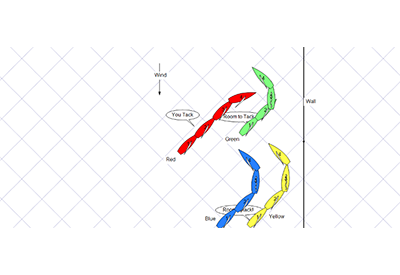
December 14, 2022
By Andrew Alberti
During my summer judging, I have heard some strange things about the hails people expect to hear. I thought that I should look at the rulebook, and see which hails are required.
The Racing Rules of Sailing, for most boats, only refers to three hails. Two of them are in Rule 20 (room to tack) and the last one is in rule 61 (Protest Requirements). Even in the Appendices of the Racing Rules of Sailing, most references to hails are revisions of those two rules. Appendix E for Radio Sailing has a few more hails and Appendix P has a hail to be made by the judges on the water, if they see a boat breaking rule 42 (propulsion). All other hails are not in the book and therefore not required. This includes hails like “Starboard”, “Hold Your Course” and “Mark-Room”.
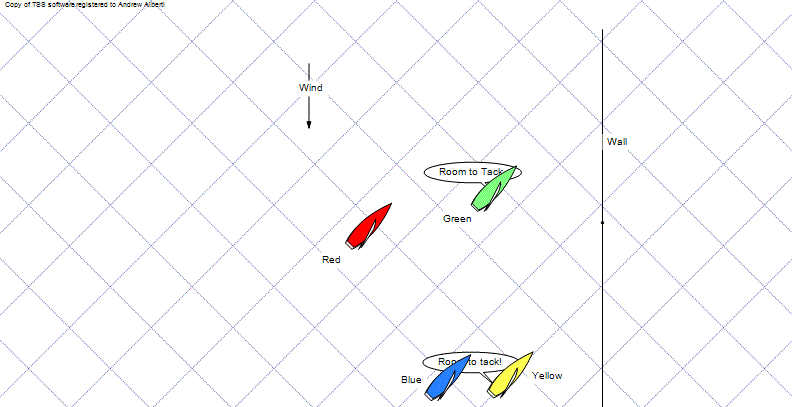
Let’s start by looking at a situation that uses rule 20. Blue and Yellow are close-hauled on port tack approaching a large seawall. If Yellow keeps going, she is going to hit the wall. At position one, she exercises her rights under rule 20.1 and calls “room to tack”. The exact words are not specified in the rule, but it says that she can hail for room to tack, so these words make the most sense and will ensure that she is understood.
Red and Green are in a similar situation and Green also hails for room to tack. Blue and Red must respond to this hail, immediately and without discussion. Here we see the two valid responses. Blue tacks, therefore giving Yellow room to tack. Red hails “You tack”. These words are specified in rule 20.2(c). Red then must give room to Green to tack and to keep clear, which she does by bearing way to go astern of Green.
In both of these cases, the boat that hailed for room to tack was on a close-hauled course. Both Yellow and Green had to make a substantial course change to avoid an obstruction safely. If Yellow or Green was not on or above a close-hauled course or they didn’t need to make a substantial course change to avoid an obstruction, then they would not be entitled to hail for room to tack. If they did hail, the other boats still must respond as described above, but the hailing boats could be protested for breaking rule 20.1. “Room to tack” and “You tack” are the first two required hails.
The last required hail is “Protest”. If a boat on the water wants to protest another boat about an incident in the racing area, she must hail “Protest” at the first reasonable opportunity. In almost all cases, the first reasonable opportunity is immediately, and there is no alternative to the hail of “protest”. Yelling “do your turns’ or “are you kidding me?” are not acceptable substitutes.
There are only two exceptions to this. The first is that if you see an incident that you want to protest, and you are too far away to hail, the hail isn’t obligatory, though it doesn’t hurt to hail anyway. However, you must inform the other boat at the first reasonable opportunity. The other exception is if you see a boat miss a mark. In this case you don’t have to tell them, until the first reasonable opportunity after the offending boat finishes.
There are no other required hails. In a future article, I will talk about other hails that are not in the rulebook.
Next time: Hails that are not required
|
Hails A language other than English may be used for a hail required by the rules provided that it is reasonable for it to be understood by all boats affected. However, a hail in English is always acceptable. 20 ROOM TO TACK AT AN OBSTRUCTION 20.1 Hailing A boat may hail for room to tack and avoid a boat on the same tack. However, she shall not hail unless (a) she is approaching an obstruction and will soon need to make a substantial course change to avoid it safely, and (b) she is sailing close-hauled or above. In addition, she shall not hail if the obstruction is a mark and a boat that is fetching it would be required to change course as a result of the hail. 20.2 Responding (a) After a boat hails, she shall give a hailed boat time to respond. (b) A hailed boat shall respond even if the hail breaks rule 20.1. (c) A hailed boat shall respond either by tacking as soon as possible, or by immediately replying ‘You tack’ and then giving the hailing boat room to tack and avoid her. (d) When a hailed boat responds, the hailing boat shall tack as soon as possible. (e) From the time a boat hails until she has tacked and avoided a hailed boat, rule 18.2 does not apply between them. 20.3 Passing On a Hail to an Additional Boat When a boat has been hailed for room to tack and she intends to respond by tacking, she may hail another boat on the same tack for room to tack and avoid her. She may hail even if her hail does not meet the conditions of rule 20.1. Rule 20.2 applies between her and a boat she hails. 20.4 Additional Requirements for Hails (a) When conditions are such that a hail may not be heard, the boat shall also make a signal that clearly indicates her need for room to tack or her response. (b) The notice of race may specify an alternative communication for a boat to indicate her need for room to tack or her response, and require boats to use it. 61 PROTEST REQUIREMENTS 61.1 Informing the Protestee (a) The protesting boat shall inform the other boat at the first reasonable opportunity. When her protest will concern an incident in the racing area, she shall hail ‘Protest’ and conspicuously display a red flag at the first reasonable opportunity for each. She shall display the flag until she is no longer racing. However, (1) if the other boat is beyond hailing distance, the protesting boat need not hail but she shall inform the other boat at the first reasonable opportunity; (2) if the hull length of the protesting boat is less than 6 metres, she need not display a red flag; (3) if the incident was an error by the other boat in sailing the course, she need not hail or display a red flag but she shall inform the other boat either before or at the first reasonable opportunity after the other boat finishes; (4) if at the time of the incident it is obvious to the protesting boat that a member of either crew is in danger, or that injury or serious damage resulted, the requirements of this rule do not apply to her, but she shall attempt to inform the other boat within the time limit of rule 61.3. |
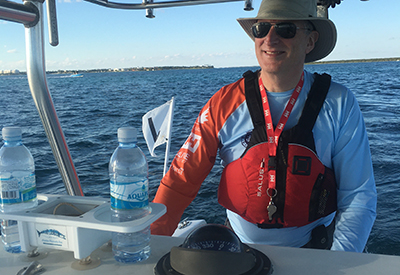 Andrew Alberti is an International Judge and National Umpire. He is a member of the Sail Canada Rules and Appeals Committees. Send your questions to Andrew at kyrules@alberti.ca
Andrew Alberti is an International Judge and National Umpire. He is a member of the Sail Canada Rules and Appeals Committees. Send your questions to Andrew at kyrules@alberti.ca

